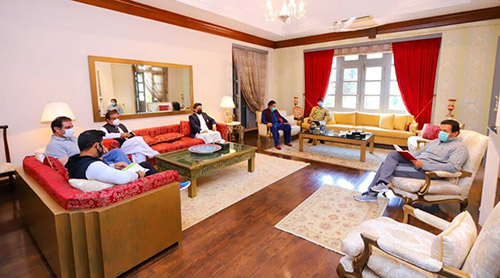On Thursday, March 25th, Prime Minister Imran Khan, who tested positive for coronavirus a few days earlier, chaired a meeting of the government’s media team at his Banigala residence in Islamabad. The meeting’s photograph — shared widely on the mainstream and social media — serves as a perfect metaphor for the overall mindset of Pakistan’s ruling elite, a vast majority of whom seldom walk the talk and trample rules and regulations at the first opportunity.
And when role models, especially those in authority, set the tone, others follow. It is extremely unfortunate that the prime minister himself did not pay heed to his own words on social distancing, and ignored the appeals made by his government’s National Command Operation Centre (NCOC) to follow the safety guidelines, including self-isolation for COVID-19 patients.
The opposition parties, despite all their lip-service to the poor, also stand guilty of the same, with their reckless conduct. At the peak of the second wave, the Pakistan Democratic Movement (PDM) had been holding public rallies across the country, in which few wore masks and there was no concept of social distancing. Even now, one witnesses its leaders going into close political huddles to mobilise their workers and supporters.

So one should not be shocked to see an overwhelming number of Pakistanis, including the so-called educated ones, ignoring NCOC guidelines.
At workplaces, and on the streets and roads, only a few people are seen wearing masks. Many continue to shake hands, and even give the traditional hug when greeting one another. Those conscientious few who want to play by the book, face satirical smiles and even a taunt or two. For the working class and people who belong to the low-income group, there are certain objective problems in following the NCOC directives. In a huge city like Karachi, where there is no organised system of public transport, it is virtually impossible for commuters to maintain physical distance. Additionally, many do not have the luxury of water to wash hands repeatedly or the money to buy even a 10-rupee mask, forget keeping a small bottle of hand sanitiser, which costs at least Rs. 150.
Against this backdrop, when Prime Minister Imran Khan himself is seen flouting the coronavirus guidelines, it sends a wrong message across the country. Maybe, the Prime Minister had a mild attack of the virus and, physically, he was feeling fit enough to return to work. Still, he and his team members should have refrained from holding a meeting which violated the basic safety guidelines and instead, held a virtual meeting, which during the pandemic is more advisable even for healthy and virus-free individuals.
At a time when Pakistan faces the rising “third wave” of coronavirus and the number of new daily cases had surpassed the 4,000 mark by end-March — the first time since July — it is extremely important for the government bigwigs to lead by example.
Admittedly, Pakistan has been lucky compared to its neighbours and even the advanced countries of the world, where the coronavirus affected millions and killed tens of thousands of people along with wrecking their economies. In a country of more than 220 million people, the official number of active cases in Pakistan at any given time mostly remained below 40,000 cases and the death toll in 2020 had been just a little over 14,000. Our hospitals and care centres were never totally overwhelmed by the number of patients, despite the country’s poor healthcare infrastructure. Moreover, the government’s decision to keep the wheels of economy moving also proved to be correct.
But this continuing run of good luck should not make Pakistanis careless, especially when the vaccination drive is being run at a very slow pace — and that too, on donated vaccines.
Our healthcare system will not be able to cope with any surge in the number of coronavirus cases. If, for instance, the active cases were to double to 80,000, a country with a population of more than 220 million and a limited number of hospitals, would not be able to handle it.



